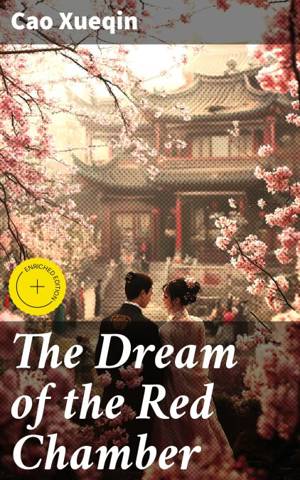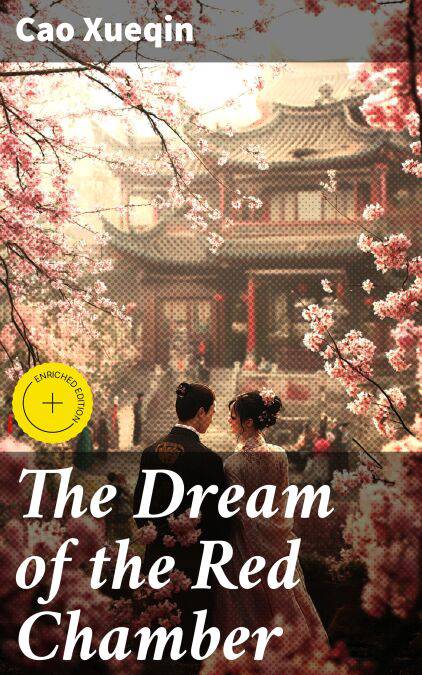
Je cadeautjes zeker op tijd in huis hebben voor de feestdagen? Kom langs in onze winkels en vind het perfecte geschenk!
- Afhalen na 1 uur in een winkel met voorraad
- Gratis thuislevering in België vanaf € 30
- Ruim aanbod met 7 miljoen producten
Je cadeautjes zeker op tijd in huis hebben voor de feestdagen? Kom langs in onze winkels en vind het perfecte geschenk!
- Afhalen na 1 uur in een winkel met voorraad
- Gratis thuislevering in België vanaf € 30
- Ruim aanbod met 7 miljoen producten
Zoeken
The Dream of the Red Chamber E-BOOK
Enriched edition. A Tale of Love, Tragedy, and Aristocratic Decline in 18th Century China
Cao Xueqin
E-book | Engels
€ 1,99
+ 1 punten
Uitvoering
Omschrijving
The Dream of the Red Chamber, a cornerstone of Chinese literature, intricately weaves a tapestry of family dynamics, societal expectations, and the intricacies of love within the framework of 18th-century Qing Dynasty China. Cao Xueqin employs a rich literary style, characterized by lyrical prose, vivid imagery, and profound psychological depth, to illustrate the poignant realities of human existence. The narrative, which revolves around the rise and fall of the Jia family, delves into themes of fate, fleeting beauty, and the illusory nature of wealth, thus positioning itself against the backdrop of a society grappling with change and decline. Cao Xueqin, born into a once-illustrious family that faced financial ruin, infused his own life experiences into this semi-autobiographical work. His background provided him with a keen insight into the complexities of social hierarchy and familial affections, which serve as the novel's backbone. Furthermore, his deep engagement with Buddhism, Daoism, and Confucian philosophy informs the metaphysical undercurrents that permeate the narrative, making it a reflective exploration of existence. I highly recommend The Dream of the Red Chamber to readers who seek a profound exploration of human emotions and societal complexities. Its nuanced characters and intricate plot will captivate those interested in classic literature, offering timeless wisdom that resonates well beyond its historical context.
In this enriched edition, we have carefully created added value for your reading experience:
- A succinct Introduction situates the work's timeless appeal and themes.
- The Synopsis outlines the central plot, highlighting key developments without spoiling critical twists.
- A detailed Historical Context immerses you in the era's events and influences that shaped the writing.
- An Author Biography reveals milestones in the author's life, illuminating the personal insights behind the text.
- A thorough Analysis dissects symbols, motifs, and character arcs to unearth underlying meanings.
- Reflection questions prompt you to engage personally with the work's messages, connecting them to modern life.
- Hand‐picked Memorable Quotes shine a spotlight on moments of literary brilliance.
- Interactive footnotes clarify unusual references, historical allusions, and archaic phrases for an effortless, more informed read.
In this enriched edition, we have carefully created added value for your reading experience:
- A succinct Introduction situates the work's timeless appeal and themes.
- The Synopsis outlines the central plot, highlighting key developments without spoiling critical twists.
- A detailed Historical Context immerses you in the era's events and influences that shaped the writing.
- An Author Biography reveals milestones in the author's life, illuminating the personal insights behind the text.
- A thorough Analysis dissects symbols, motifs, and character arcs to unearth underlying meanings.
- Reflection questions prompt you to engage personally with the work's messages, connecting them to modern life.
- Hand‐picked Memorable Quotes shine a spotlight on moments of literary brilliance.
- Interactive footnotes clarify unusual references, historical allusions, and archaic phrases for an effortless, more informed read.
Specificaties
Betrokkenen
- Auteur(s):
- Vertaler(s):
- Uitgeverij:
Inhoud
- Aantal bladzijden:
- 1018
- Taal:
- Engels
Eigenschappen
- Productcode (EAN):
- 8596547671329
- Verschijningsdatum:
- 18/11/2023
- Uitvoering:
- E-book
- Beveiligd met:
- Digital watermarking
- Formaat:
- ePub

Alleen bij Standaard Boekhandel
+ 1 punten op je klantenkaart van Standaard Boekhandel
Beoordelingen
We publiceren alleen reviews die voldoen aan de voorwaarden voor reviews. Bekijk onze voorwaarden voor reviews.









